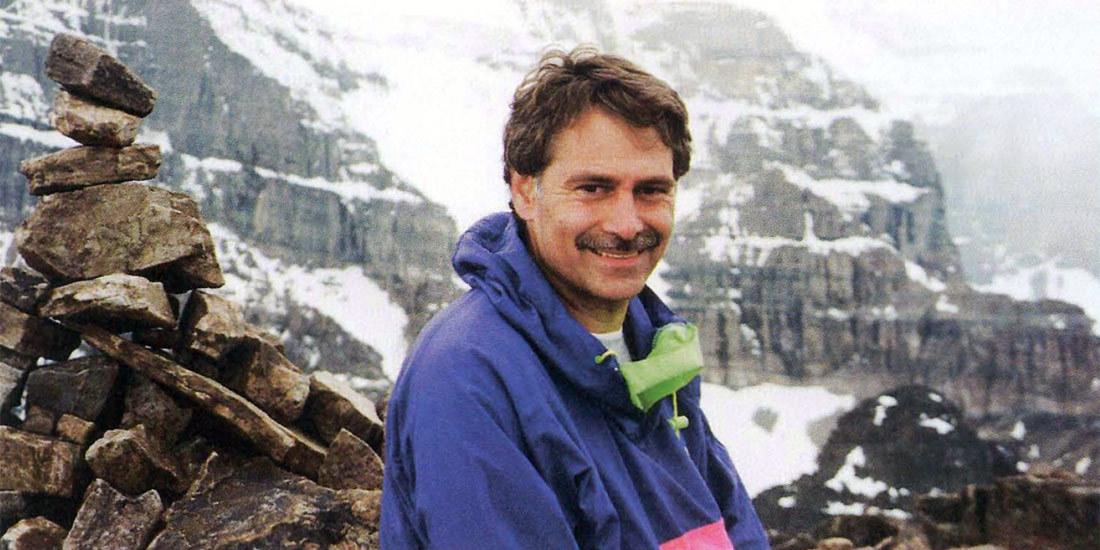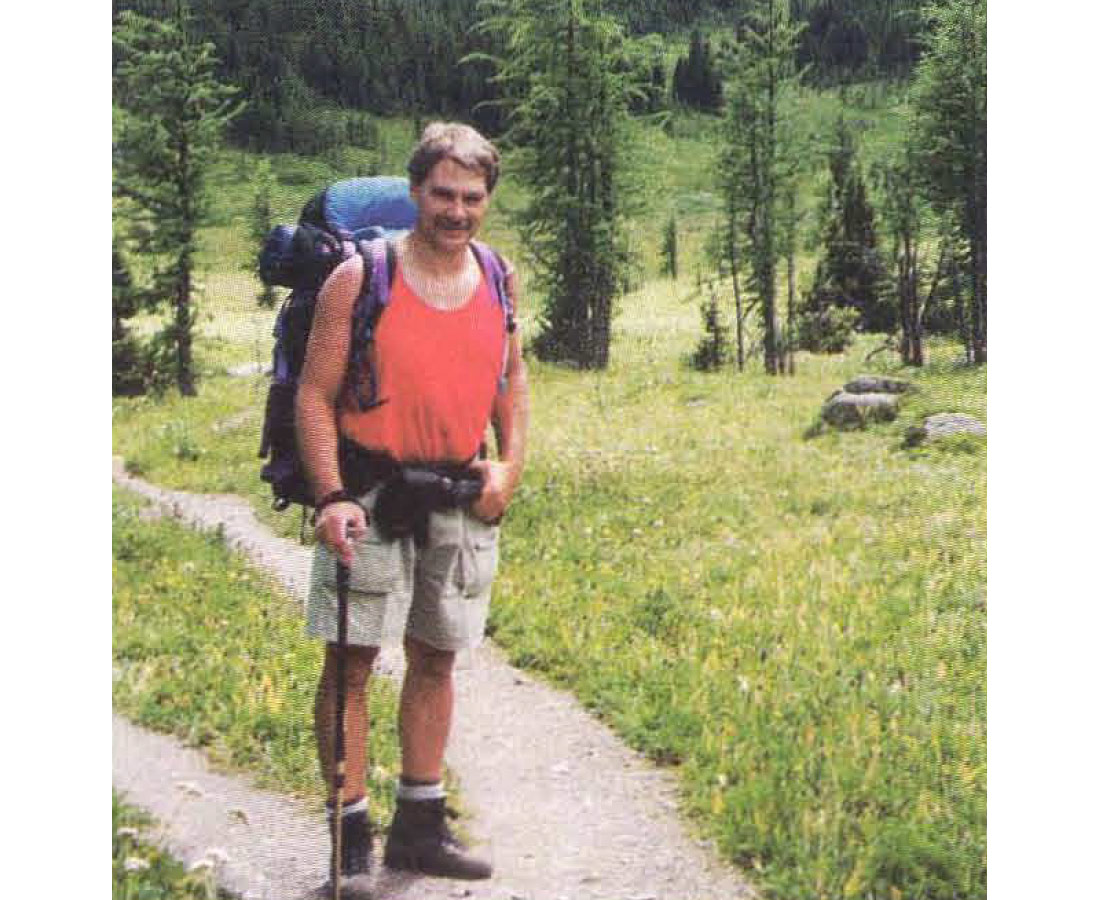
Perhaps, fate would have it that Norm Cooper's life would unfold so that he would end up gallivanting around globe as a geophysical consultant. "I really feel that I haven't just lived one life, but many different lives," Cooper says in hindsight.
Certainly, the nomadic life he experienced growing up as a child has given the tenacity he exudes so very well. In the midst of a Canadian winter, Cooper was born on February 26, 1953 in Whitehorse, Yukon Territory. The youngest of five children, he soon found himself transplanted to Edmonton, where he entered elementary school. The move was just the beginning of many. Cooper's father, a manager with CN Telecommunications, found himself transferred every time he got promoted – eventually to senior management. After four years in Edmonton, the Coopers moved to Winnipeg for five years where Norm finished elementary school. The family moved back to Edmonton, where Norm began junior high school. After two years, the Cooper family moved to Dawson Creek, B.C. where Norm finished high school.
Not following the footsteps of anyone within his immediate family, Norm entered the University of British Columbia in 1970, to study general sciences. "I always was interested in science and I enjoyed math in high school," says Cooper. "But I never knew what a geophysicist was back then."
But in the early days at university, the brutally honest Cooper confides, "I was more interested in the social life." And two years later, at the dean's request, he was asked to take a year out and re-consider his priorities.
During the 1972-1973 academic year, Cooper worked in the Northwest Territories as a lineman for a telephone company, as a gardener on the U.B.C. campus, as a taxi driver, a warehouse clerk, and a part-time rock climbing instructor. A year later, he re-entered university, "this time, I took my studies more seriously", maintaining grades and attendance, while working part-time at the warehouse which imported climbing boots and bicycles.
During the summers and fourth year university, Cooper worked in the mining industry. "It was fun," he says of working 16 to 18 hour days during fourth year, combining studies with writing geophysical reports.
Cooper's stint in the mining industry looking for copper, gold and other minerals, didn't last long. He reflects what compelled him to do the things he did. "When you live in Vancouver, the media portrayed the oil industry as being bad, ripping off Canada and they were just a bunch of crooks . I worked out of Vancouver for the mining business, long enough to find out that it's full of a bunch of bandits. I got involved with a bunch of small businesses. You would go out into the field and they would ask you to take some mineral samples and salt the property because they were going to go out and take the investors around."
The oil industry beckoned and Amoco Canada Petroleum Company recruited Cooper on camp us in 1977, the year he graduated with his bachelor's of science degree, majoring in geophysics. Immediately, after finishing his final exams, Cooper drove into Calgary from Vancouver on a May rainy day, accompanied by his first wife Theresa and their tired and hungry six-month old twin boys. It was an unnerving experience, he recalls, trying to confront downtown traffic during rush hour in a city he had never been to before – hauling behind their car, a trailer full of their belongings.
At Amoco, Cooper was allowed a free hand in experimenting with unique field and processing methods. Amoco's excellent training program provided him with some basic geophysical tools. Cooper credits his Amoco supervisors, Rob Thorburn, Frank Van Humbeck and Stu Colbourne, for being influential on his career, in the early days. Classified as "high-pot", he was groomed for management, and also became involved with teaching other geophysicists at Amoco's Tulsa, Oklahoma training centre. His future looked bright at Amoco. But in 1981, after the National Energy Program bullied its way westward, Cooper quit Amoco. He went to work for a smaller company, Voyageur Petroleums Ltd. under the guidance of Bruce Fenwick, a mentor he credits some of his today's success to.
"Here, we were, a good group of explorationists (Amoco) with a real good gas play. It didn't matter how good it was, it wasn' t going to be used... all because of politics. I didn't want to work for a company that was driven by politics, I was young and naive then," says Cooper, "Now I realize aII companies are driven by politics... it doesn' t matter how small a company is, there's always politics."

Cooper's original game plan, upon leaving Amoco was to eventually start up an exploration company. That never did happen. "Now I am more honest with myself. I figure that I probably wouldn't have made a very good explorationist. But what I do now, I do very well," says Cooper.
At Voyageur, he gained more experience in seismic field operations and program design, and financing. Then in 1983, he set up Mustagh Resources Ltd., a consultancy named after an obelisk-shaped Himalayan mountain, a mountain he had seen many times from pictures in his father's mountain books.
While seismic interpretation was what paid the bills in the early years of Mustagh Resources, the company now fills the demand for the design and management of seismic programs, linking the technical requirements of the office geophysicists to the practicalities of the field operations. Cooper also continued teaching geophysics courses for groups, as diverse as, data brokers, processors, party managers and geologists and through organizations like the Southern Alberta Institute of Technology and the Canadian Association of Geophysical Contractors. "I really enjoy teaching because I get to pass things I've learned to others, when 20 persons start asking me challenging questions, that's a learning experience because I have to rethink things from their perspective," says Cooper.
A proverbial optimist, the challenges and scrapes that have passed Cooper 's way are quickly cast aside to welcome a sense of renewal. Ten years ago, international work came his way. He now speaks the basics of several languages, including Russian, Polish, Spanish and always indulges himself in the local cultures and cuisines. All memories of foreign work, have been good, claims Cooper.
The worst thing that ever happened to him was about ten years ago, when a Libyan client's non-English speaking driver dropped Cooper off at the Benghazi airport. Although the driver used gestures to direct him through the airport alone, he sat around for hours confused. "I suddenly realized that here I was in a country and I didn't know the language. Everywhere I looked, I saw words in Arabic. I couldn't even figure out where the washrooms were. I suddenly felt I could understand what it's like to be illiterate," says Cooper.
Finally, he was drawn to some travelling university students and he asked them if they spoke English. They were embarrassed about their English, but they quickly took Cooper aside and escorted him around the airport to procure the appropriate stamp for his ticket and passport. The three students didn't leave Cooper alone, until he was ready to board his flight. Touched by their kindness, he has repeatedly asked how many Canadians would care to the same extent if a strange Arab were lost in the Calgary Airport.
Another workplace environment that has left an indelible impression for Cooper has been Borneo. In 1988, he worked on a seismic acquisitions project for Solid-State Exploration. Since then, he's made several more trips, one which was he felt placed him "in the centre spread of National Geographic."
It was a portable field operation managing 1200 persons, dressed mainly in loincloths and ringed ear lobes. Their job was mainly to produce 1200 km of seismic trail in the jungle, including about 750 km of bridging, from scratch. A delay sent Cooper on a three-day guided trip up a series of decreasingly smaller rivers, eventually leading him into the heart of one of Borneo's national parks known for its caves and bats.
The journey meant three boat changes to progressively smaller sizes, until the last boat was a dug-out, leading to a secluded cabin. His guide had prepared him a great dinner, While he was admiring the tranquility of his awesome surroundings, "I'm thinking, here I am in the heart of the Borneo, this is the last frontier that's really wild, with no civilization." The silence in this train of thought is shattered when his guide comes out from the cabin with his hands in his pockets. He invited Cooper to go to a karaoke bar. Partly out of disbelief and curiosity, he accepts. Sure enough, five miles away is a karaoke bar, when he realizes, "Then I realized that there's no such thing as an y frontier left on this planet."
The passion for his work leaves him with few regrets. At times, that has meant working 80 to 100 hours per week for clients. He is adamant about sharing his company's success with those who run the office, while he's out of town. Janice Niven and Kathryn Hill are Mustagh's two geophysical technicians. Twin sons, Michael and Jason, now 22 years-old, and both full-time university students, help their father with software development and webpage design.
Always active on at least one industry committee, Cooper is currently working on the Seismic Acquisitions Forum which occurs November 9 and 10, this year. He is also a member of the SEG, CAGC, APEGGA, CSPG and CWLS.
For recreation and personal enjoyment, outdoor pursuits, like hiking and climbing, are high on Cooper's agenda along with time well spent with his present wife Yajaira, 11-year-old daughter Kristen and three year-old son Melvin Daniel. Recently, he has taken up wakeboarding.
As he admires a picture of the Mustagh Mountain, part of him craves to visit that part of the world. Perhaps, a trip that way is possible, but for now, Cooper lets serendipity lead him. He's survived being held at knife point in Belize for a twenty dollar bill, the wild of Borneo and the pristine towers of downtown Calgary. His future calls for more learning. He still doesn't know everything about geophysics that he wants to, "I've spent all my life as a journeyman trying to use these (geophysics) tools and now I'm a craftsman, but still there's no way you can get good at all aspects...Not a day goes by when I don't learn something new."











Share This Column